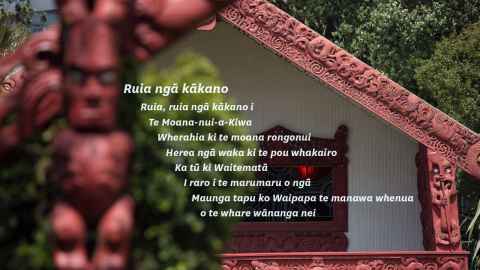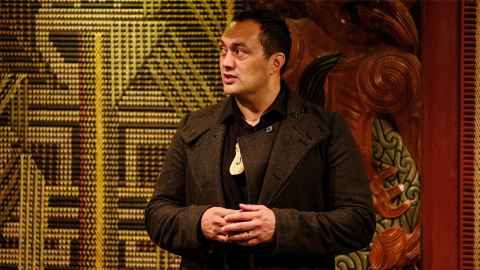Call to learn Waipapa Taumata Rau waiata
1 July 2022
We all remember our school songs, but not too many people know the University has its own waiata. It has, and it’s now a decade old.

Ten years ago, Michael Steedman, Kaiarataki at Waipapa Taumata Rau University of Auckland, composed Ruia.
It is a song speaking to the history and connections of the place and space of the University. Since then, the song has become known as the University of Auckland waiata.
Although it didn’t start with that purpose in mind, Michael says the waiata is certainly a gift, and for us all to use.
“A big part of the song’s origin is the opportunity to tell the University of Auckland story in a journey form – and a big component of storytelling is whakapapa.”
The catalyst for Ruia was a conference in New Plymouth for Māori tertiary professional staff. The Auckland visitors felt a sense of whakamā (shame) without a song to uniquely identify themselves during the pōwhiri.
“As the leading university, we didn’t have something to call upon. On the way back, and after discussion with my colleagues, I decided I would have a go at writing a song.”
Ruia is separated into four parts and follows a traditional chant style of a mōteatea. For those unfamiliar with the form, Michael explains that the cadence is not carried by guitar. “You have to find the cadence and tune yourself.”
A big part of the song’s origin is the opportunity to tell our University story in a journey form – and a big component of storytelling is whakapapa.
Carefully chosen words and phrases reference ancient proverbs, place names, histories and local waiata. These, in turn, create rich layers of identity and meaning. The lyrics draw in the singer and the listener on a journey from the ancient seed of Rangiātea, to the arrival of Pacific waka and Pākehā ships crossing the Moana nui a Kiwa, then moving through the safe harbour of the Waitematā to te pou whakairo (carved pillar).
Finally, we are guided under the gaze of the sacred maunga and deep into Papatūānuku to the heartbeat of the University, Waipapa, the marae.
“Ruia is one aspect of the broader whakapapa of the University. My hopes, and they still stand, are that songs like this provide an opportunity to do more storytelling. This is ours.”
Michael adds that this waiata may be used in all sorts of forums.
“Ngā Tauira Māori (NTM) are the ones who sing Ruia the most. NTM spend more time in that traditional storytelling space in terms of waiata. It would be great to have more people who know Ruia and can sing it, because then they become part of the storytelling that is represented.”
“The lyrics, recording, and explanatory notes of Ruia can be found on Te Kūaha app. Te Kūaha is great because it opens the door for more people to connect with the waiata.”
Kaiārahi for Te Tumu Herenga Libraries and Learning Services, Manuhiri Huatahi, says soon after Ruia was composed, Michael joined a Te Pou Rāhui (Māori staff in Te Tumu Herenga) hui and shared the story about Ruia’s origin.
“From that moment on, we took every opportunity to engage all Te Tumu Herenga staff in learning Ruia. We were so successful that for a while, many thought Ruia was the Library waiata”.

Vanda Ivanovic is part of the Library team. She admits she found learning Ruia a challenge for a long time.
“For me it was hard to understand when I didn’t have the language, even with the translation of the song. Then, we had the great fortune last year to have Michael tell us the story behind Waipapa Taumata Rau, the University of Auckland’s new name.
“At the same time I learnt some of the history of the harbour, what it used to look like before and after European contact. Places that had different roles and looked very different. So, with my new understanding of the history of Tāmaki Makaurau and Michael’s explanation, Ruia came together. Not as a song about the University, but about this place that eventually hosted the University.”
Michael says he looks forward to a time when Ruia is sung by a really big crowd of people.
“It would be truly awesome to experience that moment.”
Story by Megan Fowlie
This story first appeared in the July 2022 edition of UniNews.